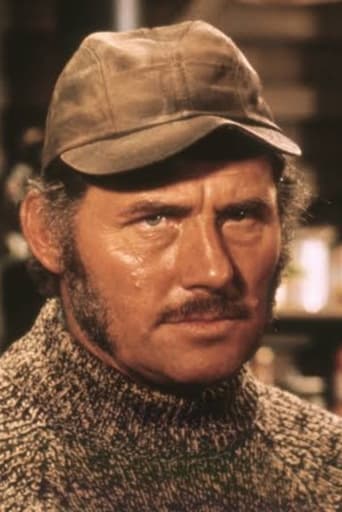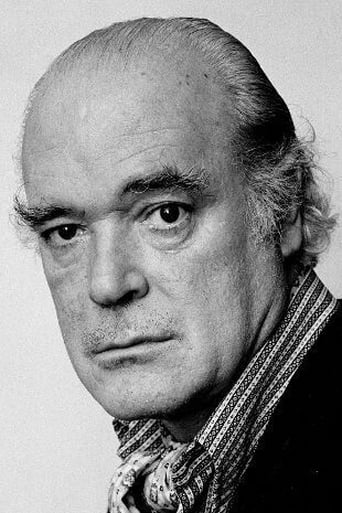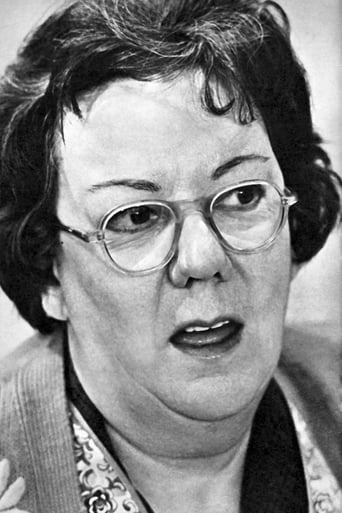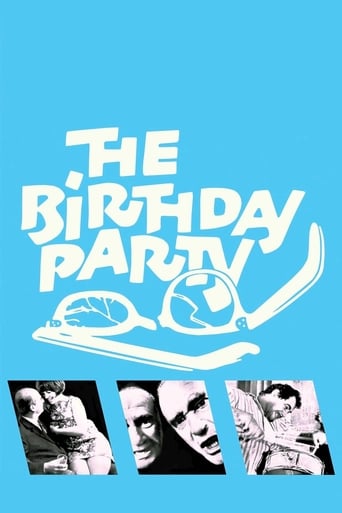
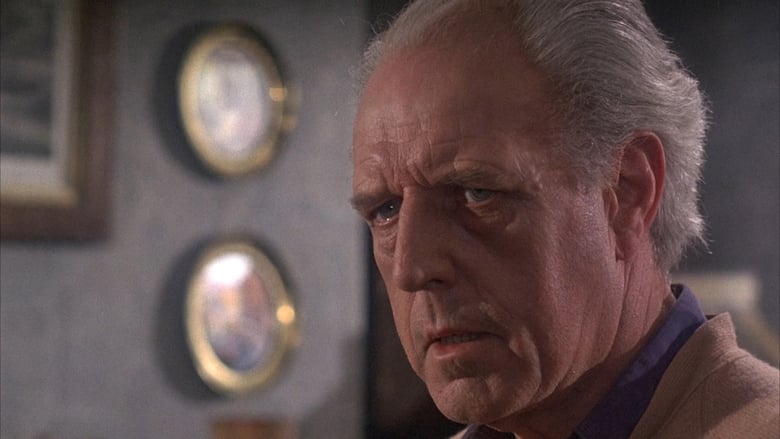
The Birthday Party (1968)
Based on Harold Pinter's enigmatic play about a boarder in a British seaside dwelling who is visited by two strangers. They torment him verbally, ask him idiotic unanswerable questions, force him to sit down and stand up, and give him a "party". Then, eventually, they take him away, a tongue-tied idiot. The trivial becomes the terrible, and with it a certain wonder, a certain pity.
Watch Trailer
Cast


Reviews
Having seen many of Pinter's efforts on screen (The Servant, The Pumpkin Eater, Accident, The Last Tycoon, Sleuth etc) over many years, it was a great pleasure to finally see this early work which entertains and tantalizes in equal measures. From a Pinter-written play first produced in 1958, one of my favorite directors, William Friedkin, briskly directed a handful of brilliant actors in a story which has puzzled viewers and critics for over forty years.Recognizing that every viewer's experience of reality is different, let me describe what I saw and suggest a possible theme: A typical, sea-side boarding house owned by a less-than-middle class, middle-aged couple (Dandy Nichols, Moultrie Kelsall) eking out their daily drudge; a lone, youngish boarder and apparent musician (Robert Shaw) who looks and acts like a rude, lazy bum; and a mysterious pair of men (Patrick Magee, Sydney Tafler) who arrive at the abode to visit the young border and celebrate his birthday.The action - talk-fest is a better word - takes place in the front dining-sitting room over the course of the day, the evening and the next morning. Initially, Stanley (Robert Shaw) is verbally battered and intimidated by Nat (Sydney Tafler) and Shamus (Patrick Magee) with conversation which oscillates from the banal to the insidious; at one point, Stanley even punches Nat. Meanwhile, Meg (Dandy Nichols) goes out food shopping; her husband, Pete (Kelsall) is out at work as beach deck-chair supervisor. Shamus, significantly, has the unsettling habit of tearing a page of newspaper into precisely ordered strips; and then arranging them as a 'page' again. Over and over again....As evening arrives, there is a birthday 'party' of sorts which gradually degenerates into a drunken altercation between the three men, leaving Stanley mentally bowed and beaten - but not physically so. The party includes the infantile game of Blind Man's Bluff, a long toast to Stanley's birthday, binge drinking, and ends with Stanley smashing bottles, glasses and finally screaming for help in the darkness. Fade to black.The next morning, with Meg and Pete out of the house, a fresh-looking Nat, looking every bit The Organization Man - including sleek, smart, black briefcase - discusses Stanley's condition with Shamus while he, once again, proceeds to tear newspaper into orderly shreds. It is during that exchange where we learn the nature of Stanley's problem and why they need to take him away. At which point, Stanley now enters as the New Man after his Birth Day: showered, shaved, and suited up appropriately - looking and acting like a condemned man. As the three prepare to depart, Pete arrives, concerned for Stanley, but is told by Nat to leave it to them to handle it all. As the front door closes, Pete calls out after them: "Stan - don't let them tell you what to do!"Pete goes back to his newspaper reading. Meg returns and, when assured by Pete that Stanley is fine, they simply continue with their new day - thus cementing their implicit acceptance of Stanley's fate. Fade to black.In my view (no pun intended), this play is a metaphor, showing how modern capitalism squeezes the young - including the artistic Stanleys of the world - into a sleazily-suited life of mindless, office sludge. Hence, it could be compared to, say, Patterns (1956) which is all about raw corporate ethics. Or, better still, The Man in the Gray Flannel Suit (1956) - a somewhat less strident critique of modern man's self-made commercial trap which ensnares most into pointless paper-pushing - and the self-destructive consequences thereof. Is there more than just a touch of Pinter in Stanley's dilemma which Pinter wrote when only 28? Perhaps.The acting, direction and cinematography are simply brilliant; as is the dialog, which must be followed closely to enjoy to the fullest. Sure, it's a claustrophobic setting for some viewers, being in one room for most of the time. All the better to concentrate on the characters, surely? Are we not, ourselves, always in one room much of the time, anyway?Highly recommended for all. Nine out of ten.
Harold Pinter adapted his own play for The Birthday Party, a bizarre and enigmatic film set in a seaside boardinghouse. Robert Shaw stars as Stanley Weber, an unemployed, failed pianist holes up in a dingy rented room only to have two strangers arrive who insidiously badger, pester, and eventually terrorize him to the point of speechlessness. With the play being written near the height of the Cold War movement in 1958, some critics have suggested Pinter is making a statement about living under a brutal Communist regime where every state action and thought is predicated on controlling and undermining the actions and thoughts of others. Meanwhile, the simple and deluded types, such as the owners of the boardinghouse, are lulled into a quasi-free existence in which they are obedient, easily influenced, or believe what they are told.The claustrophobic setting highlights the irrelevance of surroundings when one's thoughts are easily controlled or influenced. The symbolism of the game of blind man's bluff and the eyeglasses incident are not lost on the viewer considering this perception of Pinter's play. As in most of Pinter's plays, the dialog is a standout as well as the acting of the four leads. The play could just as easily be seen as an experience that confounds the viewer with its conundrums and its lack of empathy for the characters. It's reminiscent of Beckett's "Waiting For Godot" and Kafka's "The Trial", both of which are open to multiple interpretations requiring multiple viewings in order to gain additional perspectives. William Friedkin directed this, his second feature, because Pinter probably couldn't get anyone else to do it. It's definitely not a film for all tastes. *** of 4 stars.
Harold Pinter's work is infuriating at best, but this film version comes close to making some sense of 'The Birthday Party'. Dandy Nichols runs a boarding house in which oddball lodger Stanley lives (very well played by Robert Shaw) and when two unusual menacing visitors arrive (Patrick Magee and Sidney Tafler) events start to get progressively weirder. The play is dark, claustrophobic, and extremely clever, and the film plays on this - I particularly liked the sequence with the torchlight which had heaps of atmosphere. Not seen much, this version is now commercially available again and hopefully will be eventually viewed in the same light as other Pinter movies such as 'Accident'. It deserves better than it has had so far.
I must say I will take a little umbrage at the meagre critical reception this film has got; it seems to have largely been just written off as "well acted, *but* not suited/adapted to film". I would have to say it's a good thing to try and broaden the audience for what is undeniably a fine play in my opinion, by making a film. The film sticks very closely to the dramatic text, and it's a critical truism to say that the immediacy of theatre performance is lost. It may well be that Pinter is particularly good on stage (certainly judging by a recent run of "The Collection" that I saw in September), but he's also been very effective cinematically, in the adaptations of "The Servant" and "Accident". This is certainly a more constrained film than "Accident", and a little more so than the claustrophobic "The Servant"; one could say the director and others involved with the film are playing it safe, but that's no problem really, as the formula was excellent to begin with. Certain exterior shots do add a lot I feel, as does the subtle, suggestive opening in the car. For a film as "theatrical" as this is claimed to be, it has good camera sense, and handles the dialogue neatly. The scene where it shifts to monochrome in the dark light I did like. I feel that the scotched, grim, mundane colour stock of the film is certainly in tune with the play and the though.Most important perhaps, in a performance of Pinter on film, are the performances, and I must declare them to be excellent and overlooked. Robert Shaw, an actor I always enjoy ("A Man for all Seasons" and "From Russia With Love" making up a decidedly contrasting threesome of Shaw films I've seen...), is proficient as Webber, the absurd "mystery man" laying low in a seaside boarding house. Most impressive to my mind though, are Dandy Nichols, Patrick Magee and Sydney Tafler. Nichols certainly plays the darkly hilarious role of the unknowing, deluded Meg to a veritable tee. Magee and Tafler define the roles of Goldberg and McCann, the sinister, well-versed double-act, to such an extent that I'll definitely think of them in the roles from now on, when I think of the play. Magee is a foreboding, but often unwittingly droll presence in the film, timing his acting brilliantly. His Irish tones contrast finely with Goldberg's sophisticated Jewish-London accent. Tafler is an absolute marvel in this role, walking away with the film in many ways, embellishing another elusive, odd Pinter character, the most erudite in the play. He fills the screen amply and times the dialogue perfectly; a stunning performance, by a somehow obscure actor. The chap who played Petey Boles is also good, in a small but certainly necessary part.Of course, one unfamiliar with Pinter may be bemused by the oddball plot, struggle to come up with instant meanings and then describe it as weird and incoherent, as if those were bad things... Of course, it isn't truly incoherent; there are meanings and interpretations to be made if one pays close attention to the dialogue. And it is the dialogue, that, as ever with Pinter, dazzles. Suffice to say, I am not truly in a position to analyze and describe why his dialogue is so brilliant in a mere film review such as this is, but trust me, his dialogue is remarkable; making the banal seem rich and sinister, and the rich seem banal and ritualistic (in Goldberg's case). A worthy effort really, this film, I'd say, as it captures so much of the Pinter brilliance.Rating:- ****/*****


